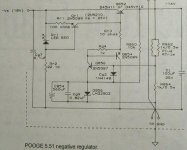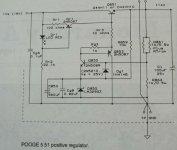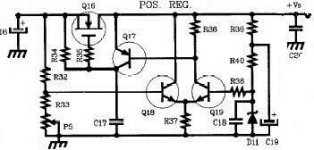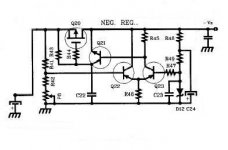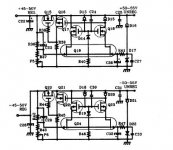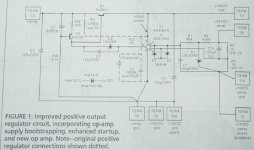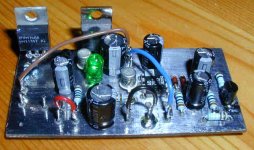Here you can find some improvements to the pooge regulator:
http://www.diyaudio.com/forums/showthread.php?s=&threadid=1437&perpage=15&pagenumber=1
Harry,how do these compare to the latest regulators(the superregulator with a floating preregulator) from Walt Jung ?
I have them in my preamp and I can´t find any noise or ripple at the output(at least not with my oscilloscope).
Nicke
http://www.diyaudio.com/forums/showthread.php?s=&threadid=1437&perpage=15&pagenumber=1
Harry,how do these compare to the latest regulators(the superregulator with a floating preregulator) from Walt Jung ?
I have them in my preamp and I can´t find any noise or ripple at the output(at least not with my oscilloscope).
Nicke
Latest Jung regulator
Harry,
If you go here you will find a clean drawing of both + and - regulators, plus the preregulator.
http://www.diyaudio.com/forums/show...29&perpage=15&highlight=carlmart&pagenumber=2
It was downloaded 189 times as I just saw.
Carlos
Harry,
If you go here you will find a clean drawing of both + and - regulators, plus the preregulator.
http://www.diyaudio.com/forums/show...29&perpage=15&highlight=carlmart&pagenumber=2
It was downloaded 189 times as I just saw.
Carlos
Good post Harry
Nice collection to play with.
For Nicke,
I'm currently awaiting some professionally produced PCB's for the updated Jung reg's (with the tracking pre-reg).
I've built about 10 units as prototypes and they are fantastic, transforming everything they've been used with, from preamp supplies to portable MD units.
The differences between the circuits are interesting. The op-amp based units all offer lower output impedance, owing to the large small-signal gains available. The downside is that op-amp compensation being what it is open-loop BW drops with frequency, hence impedance at the reg o/p rises.
The discrete circuits have the potential to offer much wider OL BW, the POOGE one, for example offers flat o/p impedance to >100kHz.
This can, subjectively, be preferable in certain applications (primarily where noise is not the major concern) as it gives a neutral sound. Impedance is nearly always higher in these designs though, without some exceptional amplifier design.
Newer op-amps offer some hope here (Ad817 / AD825) offering much wider OL BW (to approx 10kHz). It's again at the expense of impedance and noise.
The other thing to bear in mind, as Walt mentions in his 2k update, the low-noise non-degenerated front ends of units like the AD797 can easily be driven into non-linearity in certain applications (notably digital designs with high levels of HF noise). As always careful selection for application is beneficial.
For my 0.02, the op-amp suppplies are marvellous for limited supply voltages, offering the lowest noise, low o/p impedance and stunning line rejections, discrete is the only option at higher V for power amps etc.
I recommend everyone to try the POOGE (with my updates) as it's easy to trial using prototype board (or even HH's beloved p2p!) and is such an order of magnitude better sounding than a 3-terminal reg. They're stable, cheap and fun!
Andy.
Nice collection to play with.
For Nicke,
I'm currently awaiting some professionally produced PCB's for the updated Jung reg's (with the tracking pre-reg).
I've built about 10 units as prototypes and they are fantastic, transforming everything they've been used with, from preamp supplies to portable MD units.
The differences between the circuits are interesting. The op-amp based units all offer lower output impedance, owing to the large small-signal gains available. The downside is that op-amp compensation being what it is open-loop BW drops with frequency, hence impedance at the reg o/p rises.
The discrete circuits have the potential to offer much wider OL BW, the POOGE one, for example offers flat o/p impedance to >100kHz.
This can, subjectively, be preferable in certain applications (primarily where noise is not the major concern) as it gives a neutral sound. Impedance is nearly always higher in these designs though, without some exceptional amplifier design.
Newer op-amps offer some hope here (Ad817 / AD825) offering much wider OL BW (to approx 10kHz). It's again at the expense of impedance and noise.
The other thing to bear in mind, as Walt mentions in his 2k update, the low-noise non-degenerated front ends of units like the AD797 can easily be driven into non-linearity in certain applications (notably digital designs with high levels of HF noise). As always careful selection for application is beneficial.
For my 0.02, the op-amp suppplies are marvellous for limited supply voltages, offering the lowest noise, low o/p impedance and stunning line rejections, discrete is the only option at higher V for power amps etc.
I recommend everyone to try the POOGE (with my updates) as it's easy to trial using prototype board (or even HH's beloved p2p!) and is such an order of magnitude better sounding than a 3-terminal reg. They're stable, cheap and fun!
Andy.
Attachments
Re: Good post Harry
Are they much better sounding than LT1085 types?
I'm asking because I'm still looking for good regulators for my CD Pro 2 project. I'm almost settled on LT1085, but still hoping to find something better.
ALW said:
I recommend everyone to try the POOGE (with my updates) as it's easy to trial using prototype board (or even HH's beloved p2p!) and is such an order of magnitude better sounding than a 3-terminal reg. They're stable, cheap and fun!
Andy.
Are they much better sounding than LT1085 types?
I'm asking because I'm still looking for good regulators for my CD Pro 2 project. I'm almost settled on LT1085, but still hoping to find something better.
Andy
Are you able to share the PCB artwork for the updated regulator with pre-reg? I need to make up a whole bunch but have always hesitated because OC charges way too much for the boards.
Thanks,
RonS
Are you able to share the PCB artwork for the updated regulator with pre-reg? I need to make up a whole bunch but have always hesitated because OC charges way too much for the boards.
Thanks,
RonS
PCB Artwork
RonS,
I'm not keen to distribute the artwork at present, as I'm planning to sell professionally produced PCB's - sorry!
I put a massive investment in time and parts into the prototype units, and hope to recoup some of my costs to invest in future projects.
Also, the +ve reg's are the only ones I have at present, negative ones are now in the prototype build stage.
Andy.
RonS,
I'm not keen to distribute the artwork at present, as I'm planning to sell professionally produced PCB's - sorry!
I put a massive investment in time and parts into the prototype units, and hope to recoup some of my costs to invest in future projects.
Also, the +ve reg's are the only ones I have at present, negative ones are now in the prototype build stage.
Andy.
Let me rephrase my questions. All those regulators seem to be delivering 14V. What should be done to modify them into 5V?😉
ALW, I would be also interested in purchasing your boards if they come available. I've seen your previous posts and can imagine the amount of work you invested. But it's hard for me to imagine that those reg. are better than LT1085 (just kidding😉 ).
ALW, I would be also interested in purchasing your boards if they come available. I've seen your previous posts and can imagine the amount of work you invested. But it's hard for me to imagine that those reg. are better than LT1085 (just kidding😉 ).
What should be done to modify them into 5V
Not quite than simple when supplying the opamp supply with the regulators output voltage. Also the reference voltage must sit inside the common mode limit of the opamp as well as the output
of the opamp being level shifted to drive the base of the output transistor. The first step would be to find a good op amp that runs on a single 5V supply. Also what are you current demands and preferred input voltage?
Op Amp gurus?........
H.H.
Not quite than simple when supplying the opamp supply with the regulators output voltage. Also the reference voltage must sit inside the common mode limit of the opamp as well as the output
of the opamp being level shifted to drive the base of the output transistor. The first step would be to find a good op amp that runs on a single 5V supply. Also what are you current demands and preferred input voltage?
Op Amp gurus?........
H.H.
Re: What should be done to modify them into 5V
I did not find the time yet to draw and post my schematic.
I am using a 5V reference and this is "amplified" by the opamp-follower combination to 5V (gain = 1). The opamps are powered from the raw 20 V supply. For a 15 V regulator I am using a gain of 3.
For the negative regulator the reference voltage is inverted by a opamp to -5V. The positive regulator opamp is powered from +20V and the negative supply regulator opamp is powered from -20V.
It is all very simple and very good working without oscillations.
Note that for a +/-5V and +/-15V supply used in my KWAK-DAC only one reference is used.😉
It all fits just on one Eurocard (100x160mm PCB) including heatsinks.😉
More later.😉
HI,HarryHaller said:Not quite than simple when supplying the opamp supply with the regulators output voltage. Op Amp gurus?........
H.H.
I did not find the time yet to draw and post my schematic.
I am using a 5V reference and this is "amplified" by the opamp-follower combination to 5V (gain = 1). The opamps are powered from the raw 20 V supply. For a 15 V regulator I am using a gain of 3.
For the negative regulator the reference voltage is inverted by a opamp to -5V. The positive regulator opamp is powered from +20V and the negative supply regulator opamp is powered from -20V.
It is all very simple and very good working without oscillations.
Note that for a +/-5V and +/-15V supply used in my KWAK-DAC only one reference is used.😉
It all fits just on one Eurocard (100x160mm PCB) including heatsinks.😉
More later.😉
Re: Re: What should be done to modify them into 5V
Maybe it's a good thing I delayed the CD PRO construction and started modifying my A75 into Aleph.😉 I already ordered LT1085 from Digi-Key.
For the transport my raw voltage is around 16V and current demand would be 250mA.
Elso Kwak said:
More later.😉
Maybe it's a good thing I delayed the CD PRO construction and started modifying my A75 into Aleph.😉 I already ordered LT1085 from Digi-Key.
For the transport my raw voltage is around 16V and current demand would be 250mA.
The opamps are powered from the raw 20 V supply.
There goes the PSRR......... The opamps in the regulator need the best supply go can give them for good PSRR. that is the reason for powering the opamp from the supply it is providing the regulation for. Preregulators are also a good idea for best PSRR.
H.H.
There goes the PSRR......... The opamps in the regulator need the best supply go can give them for good PSRR. that is the reason for powering the opamp from the supply it is providing the regulation for. Preregulators are also a good idea for best PSRR.
H.H.
- Status
- Not open for further replies.
- Home
- Amplifiers
- Solid State
- Voltage regulators for line level circuits
